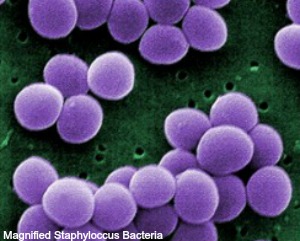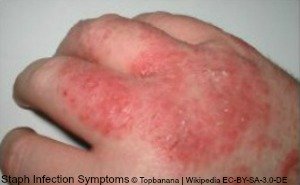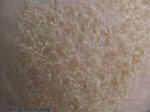A Staph Aureus Infection Is
A Complication Of Eczema.
Hard To Manage, But Is Treatable
An staph aureus infection is caused by the bacteria Staphylococcus aureus. This bacteria is the reason for one of the most common infections of eczema.
Staphylococcus aureus can live on our skin.

Though it doesn’t live on everybody's.
If someone has healthy skin there is a very low chance that it will be living on their skin.
But if you have eczema it is very different.
Reports now show that nearly everyone who suffers from eczema, especially atopic eczema, will have the bacteria living on their skin.
It likes moist, warm areas of skin. It enters the skin through cracks, which are characteristic of damaged skin and eczema.
When the bacteria is in the skin it causes the staph aureus infection that makes your eczema worse, and harder to treat.
Staph Aureus Infection Symptoms
When your eczema gets infected your symptoms become more severe. You may even notice a few new symptoms.

Your skin may look
- Red
- Sore
- Weepy
- Crusty
- dotted with yellow spots
And it will feel
- Hot
- Itchy
- Sore
A staph aureus infection can be mild or severe.
A mild infection has all the symptoms.
These symptoms can make you feel like you need to scratch more.
Doing so will damage your skin and make the infection more severe.
If the infection becomes severe you will find the symptoms get worse. Also you may feel generally unwell. It also becomes harder to treat.
When eczema is infected with Staphylococcus aureus the area of skin affected maybe larger than normal. It may also spread quickly to other areas.
Another sign of infection is when your skin is weeping. This makes your skin wet. The wetness could make your skin an ideal breeding place for bacteria.
The best way to help prevent infection is to look after your skin before an infection starts. These preventions include keeping your skin moisturised.
Using moisturizers will help protect your skin from further damage. This prevent the cracks that allow the infection to enter the skin.
There are other ways you can look after your skin and manage your eczema. If you would like some more information you can read about other eczema treatments.
Staph Infection Treatment
The first line treatment for infected eczema is usually antibiotics. They are given either as a cream to put directly on your skin, or as a tablet to take orally.
A cream is usually used when the affected skin is in a localised, smaller area. A tablet is usually used when the area affected is larger, and the eczema is more stubborn.
A topical treatment, one that goes directly on the skin, tends to be used more widely. This is because the cream is absorbed into the skin where it is directly needed.
Antibiotics can be used alongside emollients and topical corticosteroids.
Combination creams are also available to use on a staph aureus infection.
They are a combination of topical steroids and antibiotics. The antibiotic fights the infection and the steroid reduces inflammation. Reducing the inflammation can help with preventing scratching.
So if you have a mild infection your doctor may prescribe
If it is severe then the same treatments can be used. Though an oral antibiotic may be prescribed if the eczema covers a large area.
One type of treatment that should not be used with infected eczema is wet wraps. The moisture and the warmth from the wraps makes the skin a great breeding place for the bacteria.
If you are already using wet wraps as a treatment and you suspect your eczema has become infected then visit your doctor or dermatologist.
Bacterial infections to eczema can reoccur quite frequently. They mainly occur because most eczema sufferers have the Staphylococcus aureus bacteria living on their skin. This makes the chances of a recurrence pretty likely.
So doing everything you can to prevent it is the best way to go.
If an infection occurs regularly then a swab can be done. This can help determine which bacteria is causing the symptoms.
A swab is when a small piece of cotton wool is dabbed on the infected area. This collects a sample of the bacteria, which can then be identified.
This can help with treatment. It may also be that the bacteria has become immune to a certain antibiotic. This means that the treatment will not kill the bacteria. So the infection remains.
One complication of infected eczema is Eczema Herpeticum. It is caused by the same virus that causes cold sores, Herpes Simplex.
My Personal Story
I used to have regular reoccurring bouts of a staph aureus infection. It mainly started on my hands. My scratching would cause it to get worse. It would spread quicker than I could treat it.
When I first started getting flare ups I would try just using topical steroids. They would not clear it. I would have to visit my doctor to get some antibiotics. I have used topical antibiotics and oral antibiotics in the past.
If I was quick getting to the doctor then a cream was enough. If it had spread and was very sore I would be given a tablet. Both did the job. But I had to be careful to reduce the chance of getting another infection quickly after.
I had to make sure that I finished the course of treatment I was prescribed. Also I always used emollients alongside the prescribed treatment.
I haven’t had a bout for a few years. I think part of that is that I understand more about caring for my eczema and my skin. I prefer to look after my skin regularly everyday and help prevent skin damage than keep battling eczema infected with Staphylococcus aureus.
Return from Staph Aureus Infection to Types of Eczema
Return from Staph Aureus Infection to What is Eczema
Search What Is Eczema?
Advertising on What Is Eczema?
We are a participant in the Amazon Services LLC Associates Program, an affiliate program which allows sites to earn fees by advertising and linking to amazon.com. If you make a purchase through a link on this page, I may receive a small commission, at no extra cost to you. Many thanks
